Trending Now
We have updated our Privacy Policy and Terms of Use for Eurasia Group and its affiliates, including GZERO Media, to clarify the types of data we collect, how we collect it, how we use data and with whom we share data. By using our website you consent to our Terms and Conditions and Privacy Policy, including the transfer of your personal data to the United States from your country of residence, and our use of cookies described in our Cookie Policy.
{{ subpage.title }}
US President Donald J. Trump signs executive orders in the Cabinet Room of the White House on March 25, 2025.
GZERO Explains: How Trump’s executive order could impact millions of voters
US President Donald Trump signed an executive order on Tuesday that aims to secure elections by requiring proof of citizenship to register to vote. The order aims to guard against illegal immigrants voting in elections and would require all ballots to be received by Election Day.
The conundrum: The order has a strict list of ways to prove citizenship. So, while it will guard elections against illegitimate voting, it will also stop a lot of legitimate voters from casting ballots.
How does the executive order affect voter registration? Voters will have to provide proof of citizenship and valid photo identification. For most Americans, this will mean a passport or a combo of a Real ID-compliant license and a birth certificate. It also aims to eliminate online voter registration.
Who might this affect? About 140 million Americans do not have a valid passport. To put that into perspective, 153 million people voted in the 2024 presidential election. And close to 69 million women who have changed their names would have difficulty providing matching documents.
Is this enforceable? One provision of the order grants the Department of Government Efficiency, aka DOGE, the authority, with assistance from the Department of Homeland Security, to issue subpoenas to states for reviewing voter rolls to ensure compliance with federal laws. It also says that failure to comply could lead to a loss of federal funding.
But this is unlikely to fly with the courts. The US Constitution is crystal clear that Congress and the states have jurisdiction when it comes to creating election laws. This is likely to be thrown out by the courts. However, legislation called the SAVE Act was passed by the House on April 10 and contains the same provisions as the executive order, and would make them law if it is passed through the Senate.
But requiring proof of citizenship has been a goal for Republicans for a long time. So, even if the executive order is blocked nationwide, it will likely mean many GOP-led states and counties adopt rigid citizenship requirements anyway.
Are non-citizens voting? Despite levels of illegal immigration rising in the US over the last decade, audits by state officials and political scientists have concluded that it is still rare. A 2022 Georgia investigation found that there were 1,634 incidents of noncitizens potentially attempting to register to vote between 1997 and 2022, but 1,319, or 80.7% of them, happened after 2016. But, and this is important, in none of the cases was the person allowed to vote.
Are the payoffs worth it? Kansas implemented similar strict voting rules requiring proof of citizenship in 2013 in response to its Secretary of State saying that it found 129 non-citizens to have voted or tried to vote since 2000. While that accounted for 0.0007 of the state’s voters, the new rules ended up preventing more than 31,000 eligible US citizens from registering to vote after it was enacted – accounting for 12% of all first-time voter registration attempts in Kansas that year.
GZERO reveals the top 10 geopolitical game changers of 2024
2024 was a year of dramatic reversals. Some came at the ballot box, where long-ruling parties took a beating, anti-establishment figures stormed into power, or strongmen managed to see off what looked like fatal challenges. Some came on battlefields, where deadlocked conflicts began to break in one direction or another. And some came in how we think about politics and geopolitics more broadly.
This week, as we hurtle toward 2025, another year that promises to be pivotal in global affairs, we profile 10 people who, for better or worse, flipped the script, beat the odds, turned the tables, or otherwise changed the game in 2024.
GZERO's No. 10 2024 Game Changer: Italy’s Iron Lady

Who is she? Giorgia Meloni, 47, is Italy’s first female prime minister and the leader of the right-wing Fratelli d’Italia – Brothers of Italy – party. A staunch nationalist, Meloni rose to power in 2022, pledging to prioritize “God, family, and fatherland.” As a student, she was active in the neo-fascist Italian Social Movement before becoming Italy’s youngest-ever minister in Silvio Berlusconi’s government in 2008.
What did she accomplish in 2024? Meloni led her party to victory in Italy’s June elections, positioning herself as the “kingmaker” in the European Parliament. Her victory was due in part to her tough stance on migrants: Last year, Italy cut illegal immigration by 64%, inking agreements with Tunisia to reduce human smuggling and encouraging the EU to do the same with Egypt.
Meloni has faced pushback from Italian courts, however, on her plan to send migrants to Albanian processing centers. Herwide-ranging constitutional reforms to enhance executive power, including allowing the direct election of the prime minister, have also raised concern about potential shifts toward authoritarianism.
How has she changed the game? Meloni's migration crackdown found favor with other European leaders, including Hungarian President Viktor Orban. At the same time, she maintained strong support for Ukraine, recently authorizing Italy’s tenth military aid package for Kyiv. “Meloni has had a good year, and her fellow EU leaders in capitals and Brussels now hope she has been fully co-opted into the European mainstream,” said Mujtaba Rahman, Eurasia Group’s managing director for Europe.
What’s next for 2025? Meloni’s big domestic challenge is economic: Italy’s GDP is poised to grow by an anemic .5% in the coming year. Parliament passed several budget measures last week, including a one-off €100 Christmas bonus to 4.5 million disadvantaged families, and will continue allowing taxpayers to pre-pay their taxes for the next two years, regardless of how much they earn.
On the foreign policy front, Meloni may have an in with the incoming US administration in Elon Musk, with whom she famously traded compliments after he introduced her at the Atlantic Council’s Global Citizen Awards in October. However, Musk was subsequently seen to overstep when he criticized Italian judges who blocked deportations. And the two notably differ on future support for Ukraine. Time will tell whether Rome and Washington enjoy la bella vita – or not.
GZERO's No. 9 2024 Game Changer: Venezuela’s Strongman

Who is he? Venezuela’s President Nicolás Maduro has been in power for 11 years, and over the past seven of those years, he has presided over one of the most spectacular social collapses in the world. Economic mismanagement, political repression, and tight US sanctions prompted more than seven million people to flee in a migrant exodus that has reverberated across the region, from South America to South Brooklyn.
What did he accomplish in 2024? Heading into the presidential election this past July, then, it seemed almost certain that the game was up for Maduro. His approval ratings were in the gutter. A historically splintered opposition had united behind a single, reasonably popular candidate. The polling was so skewed against him it seemed like he’d have to steal the election outright to stay in power.
And that’s what he did. Even as all available evidence – including thousands of voter rolls from across the country – suggested he had lost in a landslide, his government published figures showing that he had won a narrow victory. And since then, that has been that. Threats and enticements from the US have failed to budge Maduro. His police have cracked down ferociously on the opposition. He appears to be going nowhere.
How has he changed the game? Maduro has reset what looked like a losing game not only for himself but also for various outside powers that had hoped to see him gone.
What’s next for 2025? Perhaps the most interesting piece of this story will involve the US and the incoming Trump administration.
Trump has pledged to deport millions of undocumented migrants, and many of them are Venezuelan. Where will they go? Repatriation to their home country will require an agreement of some kind with Maduro.
Trump’s Secretary of State nominee, Sen. Marco Rubio, is a Cuban-American who is ultra-hawkish on the communist regime in Cuba as well as its “21st-century socialist” backers in Caracas. If Rubio had his druthers, both governments would be out of power, but he will now need to deal tactfully with Maduro, who has shown that he is, for better or worse, to be reckoned with rather than written off.
“While Trump’s team has hinted at space for a negotiation related to migrants,” says Eurasia Group's Latin America Director Risa Grais-Targow, “the president-elect’s specific history with Maduro, loyalty to Florida voters, and preference for US oil and gas production will limit the scope for a grand bargain and further sanctions relief.”
GZERO’s No. 8 2024 Game Changer: South Africa’s divisive populist
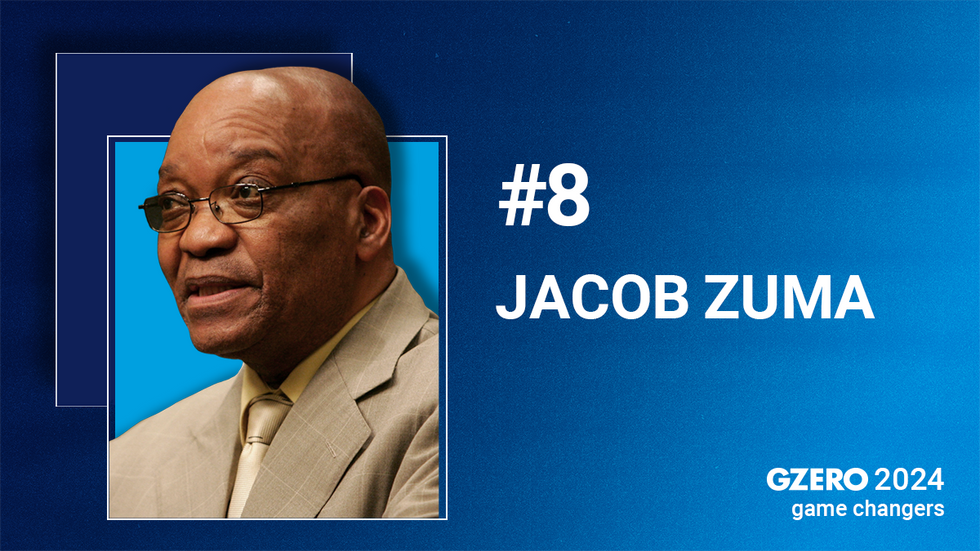
Who is he? It’s not often a former president continues to play a crucial role in the longer-term direction of his country’s politics, but Jacob Zuma is no ordinary former president. From 2009-2018, the charismatic Zuma led the African National Congress and served as South Africa’s president. A series of corruption allegations forced him from power, and Zuma felt he’d been betrayed by his deputy, Cyril Ramaphosa, who is now the ANC’s leader and South Africa’s president.
What did he accomplish in 2024? In 2024, three years after he served two months in prison on a corruption-related charge, Zuma came for his revenge. He formed a brand new political party — uMkhonto we Sizwe, or MK — and ran again for president. The new party didn’t come close to winning nationally, but by drawing 45% support in Zuma’s home region, KwaZulu-Natal, he helped strip the ANC of its national majority.
How has he changed the game? The ANC, Nelson Mandela’s party, the political embodiment of liberation from apartheid, saw its national vote share fall from 57% in 2019 to just 40% in 2024. That stunning result then forced the ANC to invite the largest opposition party, the Democratic Alliance, to form a government of national unity. This is the first time the ANC has had to share national political power since the end of apartheid more than three decades ago.
Zuma’s ambitions were not the only factor that pushed down the ANC’s vote share so sharply. South Africa is still plagued with high unemployment, inflation, corruption, crumbling infrastructure, and a lack of economic opportunity for young people. But, according to Eurasia Group Africa expert Ziyanda Stuurman, “there is a direct line between Zuma’s political maneuvers [in 2024], and the emergence of a coalition government few people would have ever thought was possible.”
What’s next for 2025? It’s too early to say whether forcing the ANC to work with the opposition DA will prove positive or negative for South African politics, but it’s clear that Jacob Zuma changed the political game this year in his country. His challenges to Ramaphosa’s government will continue into 2025.GZERO’s No. 7 2024 Game Changer: Citizens who said ‘No’ to status quo
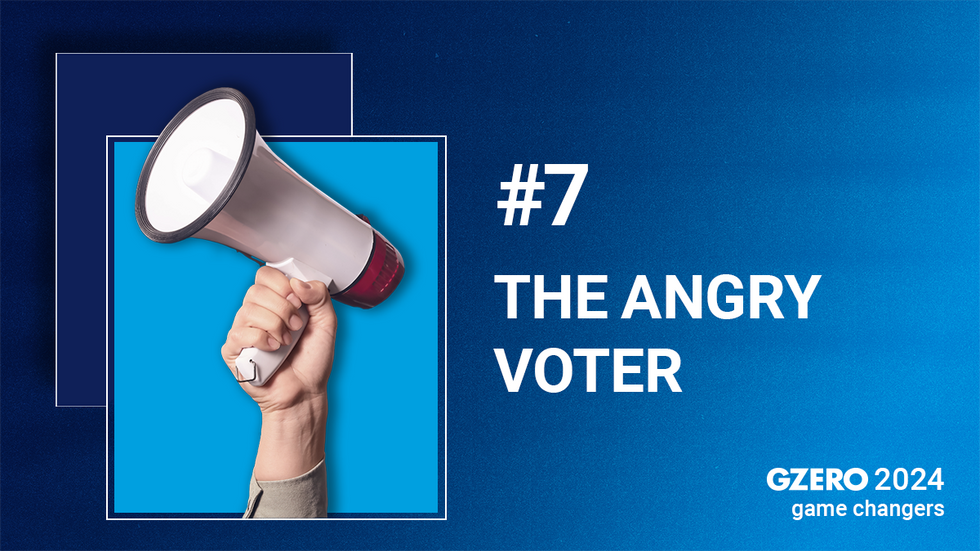
Who are they? Voters went to the polls this year in more than 50 countries with a combined population of more than 3.5 billion. A lot of them had strong messages to send their elected leaders.
What did they accomplish in 2024? In June, voters in India stunned outside observers by stripping the still-popular Prime Minister Narendra Modi’s Bharatiya Janata Party of its majority in parliament. The result forced the BJP to turn to fickle allies to pass more of Modi’s reform agenda and limited his room for maneuver.
Also in June, voters in South Africa made history by depriving the African National Congress of its majority for the first time in the country’s post-apartheid history. With just 40% of the vote, the ANC was forced to invite the opposition Democratic Alliance to form a unity government — one that has held together contrary to expectations, it must be said.
In July, voters in France punished their centrist President Emmanuel Macron by casting ballots for enough far-left and far-right parties to gut the political center. After struggling to form a government to advance state spending reforms, left- and right-wing parties came together to force Michel Barnier, a compromise choice for PM, out of his job. France’s political crisis continues.
Also in July, fed-up voters in the UK ended 14 years of rule by the Conservative Party in favor of Labour, led by new Prime Minister Sir Keir Starmer. The Conservatives' share of parliamentary seats fell from 252 to just 121, in part because Nigel Farage’s new Reform UK party drew much of the Tories’ support. And British politics has only become more combative. A November poll found that the percentage of UK adults with an unfavorable view of Starmer’s work as PM outnumbers those who approve by well over two to one.
In October, a shock election result in Japan cost the Liberal Democratic Party its majority in the Diet, the country’s legislature. The LDP has held power almost continuously for nearly 70 years.
In November, Donald Trump carried all the so-called swing states in a victory that will replace President Joe Biden and Vice President Kamala Harris with a Republican Party administration.
“Unemployment hurts a small number of people a lot, but inflation irritates everyone,” notes Eurasia Group’s Vice Chairman Gerald Butts. “Incumbents are discovering that hurting all of the people even some of the time makes the whole country angry at their government.”
GZERO’s No. 6 2024 Game Changer: Russia’s ruthless leader

Who is he? Vladimir Putin, the ex-KGB agent who has ruled Russia without interruption since the turn of the millennium, hardly needs an introduction – you know the name. But even after nearly a quarter century in power, he continues to flip scripts year in and year out, and 2024 was no different.
What did he accomplish in 2024? As recently as a year ago, Ukraine and its Western backers still held out hope that Kyiv’s forces might push back the Russian invaders who have laid waste to so much of the country since the 2022 invasion. Since then, Putin has – slowly, cynically, but successfully – shown otherwise.
Today, Russian forces are grinding their way westward in the Donbas while Ukraine suffers shortages of manpower. Kyiv’s bid to divert Russian attention from Eastern Ukraine by invading a small corner of Russia itself in August hasn’t worked out – Putin didn’t take the bait, instead calling in North Korean troops to help repel the Ukrainian incursion.
Meanwhile, US President-elect Donald Trump has questioned support for Ukraine and pledged to end the war “in 24 hours.”
How has he changed the game? By altering perceptions of what’s possible. “In 2025, Ukrainian society will be reassessing their all-or-nothing view of victory,” says Tim Mak, editor of “The Counteroffensive” in Kyiv. “As a democratic country, Ukrainians are increasingly expressing a willingness to negotiate -- and a fear that continuing the war could lead to frontline disaster due to manpower shortages.”
What’s next for 2025? Not everything is roses for Putin these days. His heavily sanctioned economy grows only because of massive military spending. Inflation is high. The population continues to shrink, as birth rates are low and hundreds of thousands of talented young people have left in opposition to the war. Russian casualties in Ukraine now dwarf those of the late Soviet Union in Afghanistan. Globally, Moscow is increasingly the junior partner to a rising China, and the Kremlin just lost Syria, its most important ally in the Middle East.
But heading into 2025, Putin has set himself up to negotiate over Ukraine, and potentially over other issues, from a position of greater strength than many had believed, or hoped, just a year ago.
Honorable Mention: Kim Jong Un

Who is he? Kim Jong Un, the 40-year-old Supreme Leader of North Korea, has been at the helm of the Hermit Kingdom since his father, Kim Jong Il, died in 2011. Following a ruthless consolidation of power, he has directed his energy and the state’s meager finances toward expanding the country’s nuclear weapons program, which he sees as central to North Korean security and sovereignty.
What did he accomplish in 2024? He concluded a mutual defense treaty with Russia while hosting President Vladimir Putin in Pyongyang in June — the first visit to the city by a Russian leader in a quarter century — that laid the groundwork for his deployment of troops to fight in Ukrainian-occupied areas of Russia. The deployment is a major escalation compared to the weapons aid he has been supplying Moscow since 2023, though thus far he has acted with total impunity. That treaty also opened much deeper cooperation with Russia to advance North Korea’s military technology, including progress on nuclear-powered submarines and a more powerful ballistic missile as well as attempts to launch spy satellites.
Kim radically overhauled his government's policy toward South Korea. In January, he renounced the goal of reunification with the South, officially removing it from the constitution. He also rather theatrically destroyed road and rail links to the south, constructed during a period of rapprochement at the turn of the 21st century.
How has he changed the game? By changing the terms on which it’s played. “The dramatic deepening of North Korea-Russia diplomatic and security ties in 2024,” says Eurasia Group expert Jeremy Chan, “has given Pyongyang more strategic optionality and greater assurance that neither South Korea nor the US will attempt an invasion.”
Seoul and Washington can’t credibly threaten military action without running unacceptable risks, and Kim’s control over domestic affairs still appears iron-clad. What’s more, by deepening relations with Moscow, Kim puts pressure on his frenemies in Beijing, who have few tools at their disposal in the relationship besides accommodation.
What’s next for 2025? If Kim has his druthers, talks with Donald Trump to secure recognition of his nuclear status. “These various nuclear and defense-related capabilities attained in 2024 will provide Kim with leverage in future negotiations with Trump,” says Chan, “while allowing Pyongyang to retain its hard-won nuclear deterrent, something which Kim has vowed will never be bargained away.”
Couple that with political chaos in the South after Yoon Suk Yeol’s attempted coup in early December, and it’s looking like the peninsula is in for a wild ride next year.
GZERO’s No. 5 2024 Game Changer: The Syrian rebel who reshaped the region

Who is he? The 42-year-old leader of the Syrian jihadist group Hayat Tahrir al-Sham, or HTS, al-Golani, born Ahmed Hussein Al-Shara, grew up in a middle-class Syrian family. He went to Iraq in 2003 to fight with al-Qaida against the US occupation, taking his nom de guerre “al-Golani” to honor relatives displaced from the Golan Heights, an area of Syria that Israel has occupied since 1967.
After the Syrian civil war began in 2011, al-Golani founded the anti-Assad jihadist Nusra Front group, which later rebranded as HTS.
In recent years, as he established control over northwestern Syria, al-Golani has sought to distance himself from global jihad and present himself as a statesman interested in stabilizing Syria.
What did he accomplish in 2024? In early December, HTS led a military campaign that surged across the country, capturing key cities within days. When the Syrian regime’s longtime backers in Russia and Iran failed to send more support to Bashar Assad, the game was up. In little more than a week, al-Golani’s forces had toppled the 54-year-old House of Assad.
How has he changed the game? The collapse of the famously despotic Assad regime has sent shockwaves through the region. Syria, for decades a bulwark of expanding regional power for Shia Iran, as well as Russia, is now under the nominal control of HTS, a Sunni group with links to Turkey, a country politically at odds with most major Arab powers. Israel is watching warily and has already struck at Syrian arms depots to prevent them from falling into the hands of anti-Zionist groups. Donald Trump wants the US to “stay out of it,” but he’ll inherit the nearly 1,000 US troops in Syria fighting Islamic State remnants. Iran and Russia, for their part, can hardly be expected to simply fade away.
What’s next for 2025? Al-Golani’s rule is barely a week old. He must establish order in a fractious country wrecked by more than a decade of brutal civil war. Can he? And will his vision of Syria allow the country’s sectarian minorities to live in peace and dignity? Is there a world where the 7 million Syrian refugees who have gone to Turkey and Europe since 2011 really choose to return?
In some ways, “the collapse of the Assad regime is the Middle East’s most hopeful moment in over a decade,” says Firas Maksad, a senior fellow at the Middle East Institute in Washington, DC. “But it carries within it the seeds of further communal and regional conflicts that could persist for a decade to come.”
What we know for sure is that al-Golani’s forces have already smashed decades-old assumptions about the balance of geopolitical, regional, and sectarian power in a volatile region. Whatever comes next begins now.
GZERO’s No. 4 2024 Game Changer: Israel’s political survivor
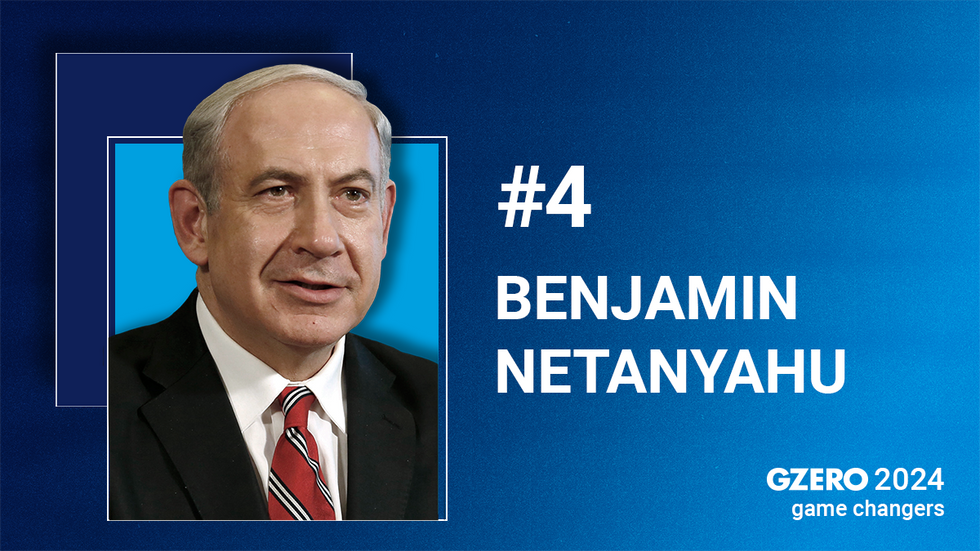
Who is he? Israel’s longest-serving prime minister, Benjamin Netanyahu leads the right-wing Likud Party. He was the first Israeli prime minister elected by direct popular vote in 1996 and served until 1999. He regained the premiership from 2009 to 2021, and then again in November 2022. His latest administration has been marked by the Oct. 7, 2023 attack by Hamas, mistreatment of Palestinian groups, limiting the Supreme Court’s power, and his own legal challenges, including charges of bribery and fraud.
What did he accomplish in 2024? Netanyahu has, as he promised in the wake of Oct. 7, reshaped the balance of power in the Middle East.
He has greatly weakened Israel’s adversaries, Hezbollah and Hamas, eliminating Hamas leader Yahya Sinwar and Hezbollah chief Hassan Nasrallah. Israel used the fall of Syria’s Assad regime as an opportunity to take control of areas in Syria beyond the Golan Heights and take out its neighbor’s military capabilities. Meanwhile, doubts about Israel’s deterrence abilities following Oct. 7 have been restored after it largely shot down all of Iran’s retaliatory missile strikes.
Eurasia Group’s Senior Analyst Greg Brew says Netanyahu’s greatest triumph was overseeing the war against Hezbollah, which decimated the group’s leadership, killed thousands of its fighters, and degraded its capacity to strike Israeli cities, without triggering serious retaliation.
How did he change the game? Netanyahu began 2024 with 85% of Israelis calling for his removal and officials circulating petitions calling him an “existential threat” to the country over his handling of the Gaza War. He is accused of abandoning the Oct. 7 hostages and prolonging the war for his own benefit.
"Netanyahu began 2024 still dealing with the aftershocks of October 7 - military, political and social - and a full-fledged offensive in Gaza," says Tel Aviv based journalist and advisor at Israel Policy Forum Neri Zilber. "The ensuing year saw him slowly grind down his opponents both domestic and foreign, following one overarching objective: playing for time and remaining in power. And it worked probably better than he could have ever expected."
He ignored US demands to treat Gazans humanely, calling Washington’s bluff over withholding military aid if Israel did not increase the flow of food and humanitarian aid. However, doing so has further alienated Israel on the global stage, leading global institutions, leaders, and human rights groups to accuse Netanyahu of committing genocide in Gaza.
Nevertheless, he is ending the year with a 47% approval rating, seeing his popularity rebound after his aggressive campaign against Hezbollah and Iran. “Netanyahu is looking much stronger than he was six months ago,” says Brew. “The war against Hezbollah, the strikes on Iran, and the decimation of Hamas has strengthened his claim to be the strongest figure ensuring Israel’s security.”
While centrist figures like Yoav Gallant and Benny Gantz have departed his cabinet, forcing Netanyahu to rely more heavily on far-right figures, “he has kept his coalition together and looks likely to do so in 2025,” explains Brew.
What to expect from him in 2025? The coming year will open up various possibilities for Netanyahu. "He has the option of simply holding on to power and continuing the grinding low-level war in Gaza; he can opt to cut a deal for the hostages in Gaza, even at the cost of halting the war, and use it as leverage for a larger peace deal with Saudi Arabia," predicts Zilber.
In the year ahead, Netanyahu is likely to benefit from and be emboldened by the Trump administration. Donald Trump shares Israel’s hatred of Iran, supports the Gaza War ending on Israel's terms, and has appointed Mike Huckabee, who is vocally in support of Israeli settlements in the West Bank, as the ambassador to Israel. Netanyahu's dependence on far-right figures like Itamar Ben-Gvir and Bezalel Smotrich will constrain his options when it comes to normalizing relations with Arab states like Saudi Arabia — something Brew says is certain to be a US priority under Trump.
But with US support all but guaranteed and public sentiment back behind him, Netanyahu is likely to continue his aggressive maneuvers in the Middle East into 2025.
“Netanyahu’s foreign policy priority in 2025 will be addressing the threat posed by Iran, and specifically Iran's nuclear programs,” says Brew. “I expect this to be the focal point in his relationship with Trump, along with issues of importance to his coalition, such as confirming US support for the settlement of territory — and perhaps even the partial annexation — of the West Bank.”
GZERO’s No. 3 2024 Game Changer: Those responsible for global migration
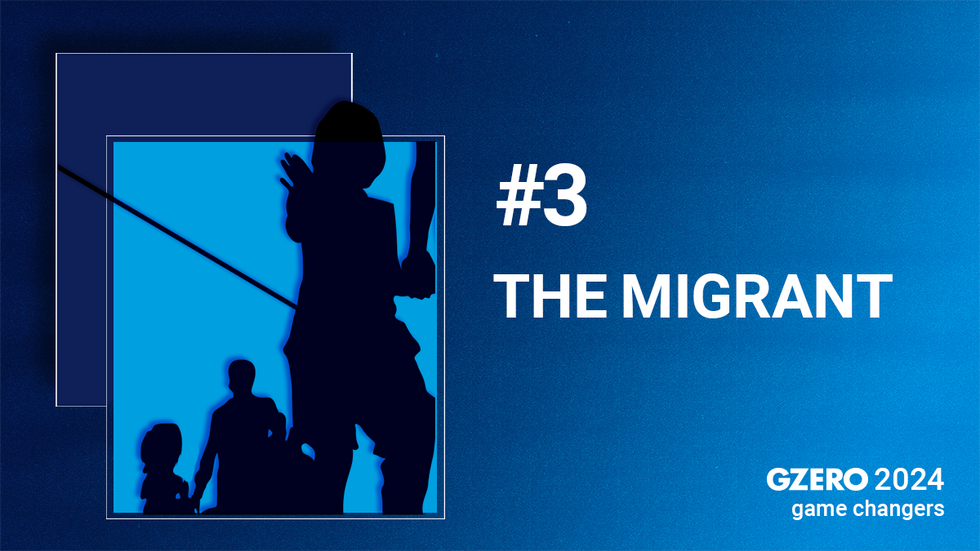
Who are they? The migrant took many forms in 2024, driven by armed conflicts, economic downturns, and the promise of opportunity – but their numbers fell as countries clamped down and closed borders. Irregular crossings of Middle Eastern and African migrants to Europe dropped by 42% in the first nine months of the year. Latin American migrants pursued better economic prospects in the US, but their numbers also declined sharply. Asian and South Asian emigres moved to Australia and Canada for education and jobs, but those countries also cut numbers back. In Africa, South Africa implemented a points system to prioritize skilled workers, while intra-continental migration surged in the North due to unrest in Sudan.
What did the migrant accomplish in 2024? Economically, migrants played a crucial role in labor markets, filling gaps in sectors like agriculture, healthcare, and technology. In some countries, their economic impact helped stave off a recession. But some migrant groups exacerbated social tensions, notably around issues that engaged their diasporas, such as the Israel-Hamas War, and also put a strain on cash-strapped public services.
And the latter issue caused a backlash among voters. “Since the pandemic, there has been a major increase in the number of immigrants, primarily legal ones, to Canada, the US, Europe, and the UK to address labor shortages,” said Graeme Thompson, senior analyst at Eurasia Group. “The problem is that first, those numbers increased very rapidly to historically unprecedented levels, and second, that has been combined with preexisting stresses on housing and social services. And that combination has proved politically explosive."
How did the migrant change the game? This past year, the migrant shaped elections around the world. Illegal immigration was the pivotal issue in the US presidential election, as now-President-elect Donald Trump accused the Democrats of failing to control America’s borders and blamed illegals for a surge in crime. In Europe, Austria's general election campaign was dominated by migration issues, with the far-right Freedom Party advocating for stringent asylum policies, while in Germany and Italy, anti-immigration parties saw a surge in support. Immigration was a key election issue in South Africa, where the ANC lost its majority as opposition parties pushed anti-migrant policies.
What to expect in 2025? The migrant will remain a source of tension as countries continue to clamp down on illegal immigration. Trump’s deportation plans could provoke a surge of migrants to Canada, prompting the Canadian government to announce a billion dollars in spending to harden its southern border. European countries, meanwhile, have stopped processing the claims of Syrian refugees in the wake of Bashar Assad’s overthrow, and many refugees plan to return home. But it remains to be seen whether the new regime will provoke a new exodus as minority groups such as the Kurds may feel under threat. The impact of immigration on housing has become a central issue in Canada and Australia, both set to have elections in 2025. And in Africa, the ongoing war in Sudan has displaced 11 million people and doesn’t look to end any time soon.
GZERO’s No. 2 2024 Game Changer: Billionaire entrepreneur
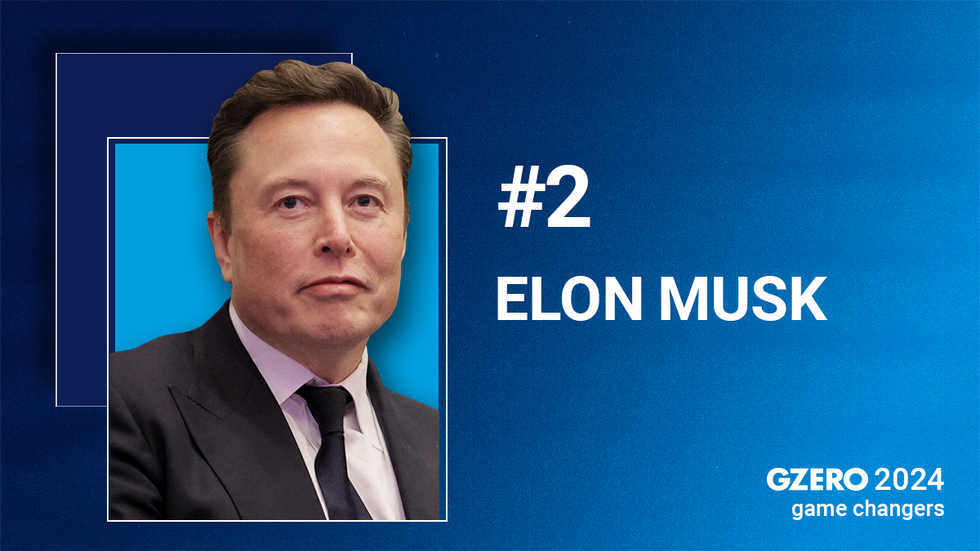
Who is he? The CEO of X, Tesla, and SpaceX, Elon Musk is the wealthiest and possibly the most powerful private citizen in the world. He controls a revolutionary space company, America’s top electric vehicle producer, and a big chunk of the global public square formerly known as Twitter. In 2025, he’s set to be the beneficiary of the biggest political bet of 2024: spending over $100 million in donations andleveraging his 200-plus million followers on X to support a Trump win for the American presidency.
What did he accomplish in 2024? In 2024, Musk became a political kingmaker. Musk’s financial and technological backing of the Trump campaign, including his use of AI-driven voter engagement tools,upended traditional election strategies. After Trump’s victory, Musk was appointed Director of Government Efficiency, or DOGE, a newly created position that will leverage private sector innovation to streamline federal operations. He even earned the praise of arch-lefty Sen. Bernie Sanders, who said “Elon Musk is right” to want to curb wasteful Pentagon spending.
How has he changed the game? Musk’s influence on politics and governance is unprecedented. By combining his tech empire with his growing political clout, Musk has blurred the lines between private enterprise and public policy. Musk has turned up on phone calls and meetings with global leaders (Ukraine’s Volodymyr Zelensky,Hungary’s Viktor Orban) and, closer to home, technology rivals (Google CEO Sundar Pichai).
What’s next for 2025? With DOGE, Musk plans to unveil a federal efficiency initiative targeting defense spending and bureaucratic red tape. While he’s not taking a salary, new programs could significantly benefit SpaceX, particularly in the area of military logistics and battlefield AI, raising questions of a conflict of interest. And Starlink’s satellites could replace Washington’s existing plans for hard-wired broadband infrastructure.
What does this mean for other companies seeking to do business with Washington – and for politicos seeking influence? “Getting on Elon’s good side has never been more important,” observes Eurasia Group President Ian Bremmer. “And for all the whispering in Trump circles that the White House won’t be big enough for their two personalities and wills, both men deserve credit for being extremely careful in managing relationships where their livelihood is at stake.”
GZERO’s No. 1 2024 Game Changer: MAGA in chief
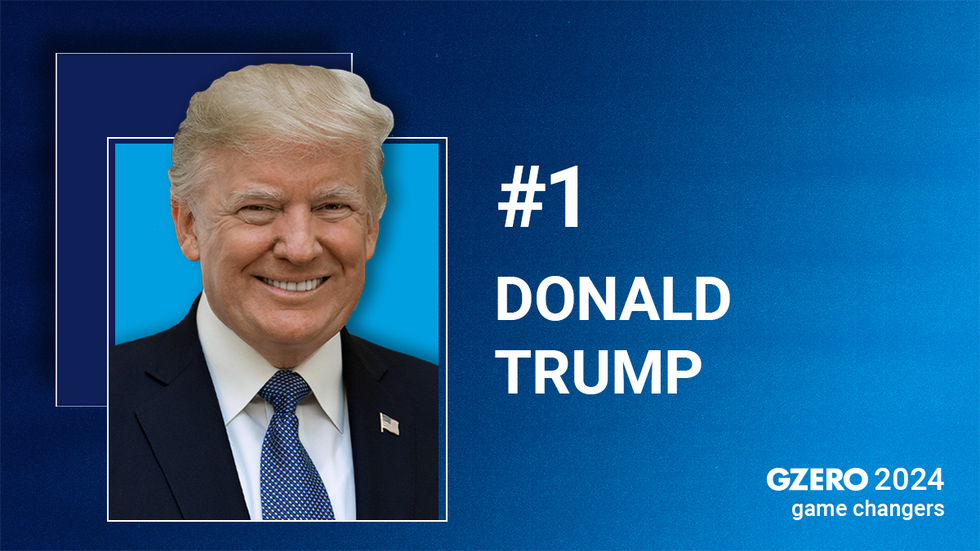
Who is he? At this point, Donald Trump – GZERO’s top political game changer of the year – needs no introduction. The New York native and real estate mogul began his political career in 2015, cementing it a year later by beating Hillary Clinton to win the presidency. But he was defeated by Joe Biden in 2020 in large part because of how he handled the COVID-19 pandemic, his harsh immigration policies, and his pattern of erratic behavior.
What did he accomplish in 2024? The former president turned president-elect is set to return to the White House after winning the electoral college and the popular vote in what was meant to be a close election. Trump is backed by a Republican-controlled Congress, a conservative majority on the Supreme Court, and a cabinet of loyalists determined to implement his policy agenda.
“Trump won the closest thing you can these days that counts as a mandate, and he’s the first Republican to win the popular vote since 2004,” says Eurasia Group’s US expert Noah Daponte-Smith. “That’s a big accomplishment, and it matters to the way he’s going to govern.”
How did he change the game? Trump’s win was no inevitability. Flash back to the Republican primaries, when he faced competition from Florida Gov. Ron DeSantis and former South Carolina Gov. Nikki Haley – until, that is, voters showed that the base remained squarely in Trump’s camp.
He prevailed despite facing 34 soon-to-be-obsolete felony convictions, the fallout from the Jan. 6 insurrection, and two states attempting to kick him off their primary ballots. In fact, in many ways, Trump used those setbacks to his advantage, spinning them to rally voters to the polls.
Trump won every swing state, accumulating the most electoral college votes for a Republican since 1988. He widened the party’s base, winning 2.5 million more votes than when he ran as the incumbent in 2020.
In doing so, he revealed the country had swung to the right, turned out a record number of young male voters, and made inroads with some Democrats – increasing his support among every demographic group besides women. He survived an assassination attempt against him and used it to further rally his party around him. The GOP is now Trump’s party, and any remaining old-school Republicans who may have opposed him have been left party-less – some even crossed the aisle to endorse Kamala Harris.
An underrated contributor to Trump’s victory was his “mastery of the new information ecosystem,” notes Daponte-Smith. “Trump’s podcast blitz in the middle of the campaign baffled many at the time but in retrospect looks to have been a deft move that enabled him to make substantial inroads among demographics that traditionally don’t lean Republican.”
What to expect from him in 2025. Even before his inauguration on Jan. 20, Trump is meeting with world leaders, compiling a cabinet of loyalists, and vowing to implement punishing tariffs on America’s allies and enemies.
In conflicts in Ukraine and the Middle East, Trump is likely to push for temporary ceasefires to demonstrate his peacemaking abilities, which may ultimately result in the partitioning of Ukraine and expanded Israeli power over Palestine. Meanwhile, he will likely restart his “maximum pressure” campaign to heavily sanction Iran.
Daponte-Smith says he is expecting Trump to make headway in three key areas: trade, taxes, and immigration. He will likely substantially raise tariffs on China in the first year while limiting illegal immigration to the US and ramping up deportations. “The tax bill at the end of the year, which will very likely extend all of the 2017 tax cuts, will be the cherry on top for Republicans, who know that trifectas tend to be short-lived and are looking to move quickly to make the most of this one.”
- 2023 game changers that weren’t ›
- Top 10 game changers of 2023 ›
- What Assad’s fall means for Syria, the Middle East, Moscow and Washington ›
- G7 meeting: Ukraine and Meloni take center stage ›
- Netanyahu's uncompromising UNGA address ›
- How will Trump 2.0 approach foreign policy? ›
- Elon Musk and the Political Power of Young Men ›
Bloc by Bloc: Five demographic trends to watch on Election Day
Well, here we are. After a punishingly long, mind-bogglingly expensive, and unusually unnerving US presidential campaign, Election Day is upon us.
Over the past few months, our Bloc by Bloc series took a look at some of the voting demographics that will likely play a key role in the outcome, so as we head down to the wire, here are five key takeaways to recap:
First, this election is very much about gender and perceptions of gender roles. In part, that’s because Kamala Harris is vying to become the first female president, running against an opponent who has been found liable for sexual assault against women in the past. But it’s also because of how each campaign frames its pitch and where each is seeking support.
The Trump campaign has leaned hard into winning the support of men, young men in particular, at times embracing a kind of hypermasculinity in its messaging – Hulk Hogan ripping his shirt off at the RNC has become a signature moment. The Harris campaign, meanwhile, has sought to galvanize female voters, in particular by arguing that a second Trump presidency might further restrict women’s access to abortion and other reproductive health care, charges that Trump and his running mate JD Vance have recently sought to refute. In the latest polls, there is a 12-13 point gender gap between the two candidates. Read more here.
Second, key minority blocs look set to vote Republican at higher rates than in the recent past, with potentially decisive impacts in swing states. The Latino, Black, and Arab-American votes have been dependably Democratic for decades, and it is very unlikely that Trump will win any of these groups outright. But he could very well draw significantly more support than Republican candidates have in the past, as economic perceptions, culture war issues, and key concerns such as immigration or the war in Gaza scramble traditional voting patterns. Given the strong presence of these groups in key swing states such as Arizona, Nevada, Pennsylvania, Michigan, Wisconsin, and Georgia, even small shifts could have a big impact. For our look at the Black vote, see here. On the complex and shifting Latino vote (the largest minority voting bloc in the country), we took a look both before Biden stepped out and afterward. Our profile of a rapidly changing Arab-American vote in the shadow of Oct. 7 and Israel’s assault on Gaza is here.
Third, the partisan class divide is real – but with a caveat. Back in September, the historically Democrat-leaning Teamsters union decided not to endorse a candidate for the first time in decades. Why? At least partly because an internal poll showed the union’s rank and file breaking in favor of Trump, whose pledges to crack down on illegal immigration and stop import competition from abroad have been popular with this demographic. Given that the election could well turn on who wins more of the so-called “Rust Belt” – that is, Pennsylvania, Michigan, and Wisconsin – the preferences of the working class could be decisive.
There is a caveat here, however: Among white working-class voters, Trump leads by roughly 30 points, but among non-white working-class voters, the reverse is true (most non-white working-class folks are Black and Latino). Read more about the class divide here.
Fourth, for all the attention on the youth vote, the senior circuit could be decisive. In 2020, Joe Biden managed to turn the senior vote blue for the first time in decades – whether Harris will be able to continue that trend could be decisive. For all the focus of both candidates on youth voters, the senior vote – which typically shows high turnout and relatively conservative leanings – is worth watching. The latest polls show a more or less dead heat between the two candidates among voters aged 65 and older. For more on the youth and senior votes, see here.
Fifth, take the idea of “voting blocs” with a grain of sense. These categories – Black, Hispanic, Working class, Women, Men, Young, Old – are, of course, huge oversimplifications of the preferences and experiences of tens of millions of individual people. For the purposes of analysis and polling, this is useful, but as you think about the election, it goes without saying that it’s important to remember that each person will ultimately cast their vote for reasons that are important to them, not to some group identity assigned to them by a pollster, census worker, campaign strategist, media executive, or political analyst. This may seem like an obvious point, but it’s worth remembering, particularly as you try to understand, after the fact, why either candidate won or lost.
Pro-Palestinian protesters rally for a cease-fire in Gaza during the ongoing conflict between Israel and Hamas in Dearborn, Michigan, on May 19, 2024.
Bloc by Bloc: The Arab-American vote in the shadow of Oct. 7
This GZERO 2024 election series looks at America’s changing voting patterns, bloc by bloc.
________________________________
In 2019, Mohamed S, an Egyptian-born investment consultant who had lived in New York for more than 20 years, finally decided to apply for US citizenship, for one reason:
“I wanted to vote against Donald Trump.”
But the pandemic delayed his naturalization until after the election. Next month will be the 47-year-old’s first chance to vote in a US presidential race. But this time, Mohamed says, he’s not going to cast a ballot at all.
Mohamed, who asked that we not use his last name over concerns his views might affect his business, said that while he still opposes Trump, the Biden administration’s Gaza policy has made it impossible for him to support a Democrat this fall.
“Why would I vote for a person who has provided weapons and funding that have been used to kill children who look exactly like my son, speak the same language as my son?” Mohamed asks. “That’s an outrageous thing to expect me to do.”
Mohamed’s views echo wider shifts in the Arab American community in the year since Hamas’ murderous rampage through southern Israel on Oct. 7, 2023, provoked an Israeli response that has killed at least 40,000 people in Gaza and displaced nearly 2 million, according to local authorities. Israel has faced charges of genocide in international courts.
A small community with big electoral power
About 4 million people in the United States identify as Arab Americans. They are a community of diverse faiths, national origins, and viewpoints. Roughly two-thirds are Christian, and one-third are Muslim. They have a large presence in key swing states like Michigan, comprising about 5% of the electorate there, and Pennsylvania, where they make up about 2%.
The war in Gaza looms large for them. More than 80% in a recent poll by the Arab American Institute, an advocacy group, said it’s their top election issue.
That marks the first time that any conflict in the Middle East has topped the list of concerns among Arab Americans, says AAI chairman James Zogby.
“It’s a genocide. And the administration’s response has been abysmal,” says Zogby, “not just in its full-throated support for Israel, but in its failure to put any restraint on Israel.”
Democrats are now paying the price
For decades, Arab Americans were a reliably blue voting bloc. Only about a third of the community ever voted Republican. In 2020, Biden got 59% of the Arab American vote against Trump’s 30%.
But the AAI poll, taken in early October, showed Trump edging out Harris 42% to 41% among Arab American voters — a 12-point swing in Trump’s favor. Expected turnout, meanwhile, has fallen from a historical average of 80% to around 60%.
Given that Biden won Michigan by less than three points in 2020, and Pennsylvania by just over one point, Arab American voters’ choices – not only about whom to vote for but whether to vote at all — could shape the outcome in November. At the moment, Harris leads Trump by roughly one point in both states.
Feeling ignored at a fraught moment
Zogby says weak outreach from the Democrat camp has hurt Harris. The Democrats’ rejection of calls for a Palestinian speaker at the Democratic National Convention stung, and the failure to hold high-level meetings with Arab American leaders — as opposed to lumping them in as part of a broader outreach to Muslim Americans — has made the community feel marginalized at a painful time.
“I’d love for her to call for a cease-fire, of course, but if she just got up and gave a speech in Michigan and said, ‘I want your support, I know we have differences, but I know we can talk them through, it would make a difference,” says Zogby.
Some Arab American voters are going further than simply staying home on Election Day.
“Six months ago, I was a Democrat,” says Bishara Bahbah, a Jerusalem-born, Harvard-trained academic and journalist. Now he is the founder of Arab Americans for Trump.
“I came to the conclusion that not only do I not want to vote for Biden or Harris, I want to actually punish them,” says Bahbah, a Palestinian Christian who grew up in East Jerusalem and now lives in Arizona.
Financed by Bahbah himself, Arab Americans for Trump has been coordinating events with Massad Boulos, the Lebanese-born businessman and father-in-law to Trump’s daughter Tiffany, as well as former Ambassador Richard Grenell, who was Trump’s acting director of national intelligence. Bahbah has met with Trump directly at least once, he says.
The Trump campaign has sought to expand its small base of Arab American support with pledges to cut taxes, crack down on undocumented immigration, and defend traditional views on gender, which plays well in many socially conservative Arab households.
A recent endorsement by Amer Ghalib, the Yemen-born mayor of Hamtramck, a Detroit suburb and the only US city with an all-Muslim local government, has helped the Trump effort.
Bahbah dismisses concerns about Trump’s history of strongly pro-Israel policies and his recent pledge to bring the US “closer [to Israel] than it’s ever been.”
“The difference is the Democratic camp has blood on their hands,” says Bahbah, who says he lost three relatives in an Israeli airstrike on an ancient church in Gaza last October. “President Trump does not.”
Bahbah is confident that Trump, without reelection to worry about, would make a push for a two-state solution after all.
“I think he is interested in leaving a legacy of a peacemaker.”
Not everyone who has soured on the Democrats shares that optimism about Trump.
“I’m not naive enough to believe that Trump would be better,” says Mohamed, the New York-based consultant. “I just don’t see a scenario in which Kamala Harris wins and things change in Gaza.”
But Zogby still sees more opportunity with a Democrat in the White House than not.
“There’s a coalition that exists in the Senate around Palestinian rights,” he says. “I would rather be fighting alongside them with a Democratic president than with a Republican president or a Republican Congress that wouldn’t give a shit at all.”
“People tell me it can’t be worse,” he says, “but it can always be worse.”
A Trump Vance campaign sign sits at the Cobb County Republican Party's booth at the Pigs and Peaches Country Festival in Kennesaw, Georgia, on Aug. 17, 2024.
Trump’s ground-game gamble
Both sides know they must motivate as many supporters, and potential supporters, as possible to cast a ballot. Harris is taking a more conventional approach to the “ground game” by relying on the resources of the Democratic National Committee and onhundreds of thousands of volunteers to knock on doors in key states and to register more voters likely to support her.
Trump has a different strategy. Rather than relying on the Republican National Committee and volunteers as past GOP presidential candidates have done, the Trump campaign is reportedly outsourcing these operations to outside groups, including one backed by Elon Musk, to target mainly undecided voters. These groups pay workers to do the groundwork once done mainly by volunteers.
If this strategy works, it may change future campaigns for both parties. If it doesn’t, Trump’s gamble will likely be remembered as a bad idea that helped cost him the election.
What Florida's abortion rulings mean for the 2024 US election
Jon Lieber, head of Eurasia Group's coverage of political and policy developments in Washington, DC, shares his perspective on US politics.
This is what we are watching in US Politics this week: Abortion.
Abortion is the big story in US politics this week with the Florida state Supreme Court ruling that a ballot initiative that would protect access to abortion up until fetal viability will be on the ballot in abortion in Florida this year. Democrats are excited about this ruling because it was starting to look like Florida was increasingly out of reach for them.
Republicans now out register Democratic voters in the state by over 800,000 registered voters, which is a flip from a decade ago when Democrats outnumbered Republicans by about 500,000 registered voters. Florida is looking like more and more of a red state with a massive 20 point victory for Republican Governor Ron DeSantis in the 2022 midterm elections. That's what was making Democrats feel like it wouldn't be a very competitive state in this presidential cycle.
However, with abortion on the ballot, they now see an opportunity for outside groups to come in and spend a bunch of money who otherwise wouldn't have sent money there, forcing Republicans to respond by potentially wasting money there. The state is probably a little bit too red for it to truly be competitive for President Biden in this election cycle.
But this abortion referendum story is going to play out across the country. Democratic activists have the opportunity to get abortion on the ballot in two critical swing states of Nevada and Arizona. But it's unlikely they would show up in the other swing states of Wisconsin or Michigan, because Wisconsin had a recent state Supreme Court decision about it. And Michigan had an abortion referendum in 2022. That doesn't mean they can't find other ways to make this election about access to abortion, which has been a very positive issue for Democrats.
There have been seven state referendums since the Supreme Court overturned Roe v. Wade. And in each of those, the electorate shifted significantly to the left from what they did in the 2020 results, even in deep red states like Kansas and Kentucky. So this is going to be an important issue to keep watching throughout the election. And could be one of the wild cards that helps Joe Biden overcome the bad polls that he's been experiencing in recent weeks.
Trump will use election fraud claims to stay relevant through 2021
Get insights on the latest news in US politics from Jon Lieber, head of Eurasia Group's coverage of political and policy developments in Washington:
The Electoral College has voted. Why is Trump still refusing to acknowledge defeat?
Well, the President has a long history of criticizing people who lose elections as losers, who quote, "choke like a dog." And I don't think the President wants to admit to himself that he is a loser who choked like a dog. In addition, he's building a pretty impressive political operation based off claims that the election was stolen from him. He's raised over $200 million in the month since the election, and that political operation is going to keep him relevant in the media and in Republican politics for at least the rest of 2021. I think that the claims of election fraud are really central to that operation. So, don't expect Trump to concede anytime soon, even after Republicans start broadly acknowledging his loss.
Why is Attorney General William Barr resigning?
Barr had been one of the President's biggest loyalists. He'd used the Department of Justice in order to advance many Trump causes. And after the election, it looked like he was moving in a different direction. Ostensibly, he's doing it to spend time with his family around Christmas, which is what President Trump said. But in recent weeks, it's come out that Barr didn't acknowledge the DOJ was investigating Hunter Biden before the election; and also, he's been disputing the President's claims of voter fraud. So, I think that relationship just wasn't tenable anymore. Barr's on his way out in the closing days of the administration.
How will the US respond to recent Russian cyber attacks?
Well first, the US has to be sure beyond a shadow of a doubt that the perpetrators of these attacks were Russian. It's possible that there's a false attribution, although it looks very likely these things were carried out by the Russian government. Second, the US is likely to respond with sanctions targeted at the people who did the deed, unless it turns out that this was more than just an intelligence gathering operation and, in fact, targeted US critical infrastructure or was an attempt to damage some US companies or the government. In that case, you may see something much, much broader than sanctions, up into and including cyber attacks back on the Russians to make sure that they pay a price for having done this. Third, a lot of this may not happen until the Biden administration. With the transition of government happening now and going til January 20th, the Biden people may want to reset their approach to Russia altogether, and you may see a much more aggressive response to Russia that goes beyond targeted sanctions starting in the new year.
Malaysian opposition backs bid to lower voting age to 18
Malaysia's Pakatan Harapan (PH) administration will be able to pass a proposed amendment to the Constitution to lower the voting age from 21 to 18, after the opposition yesterday agreed to support it.

